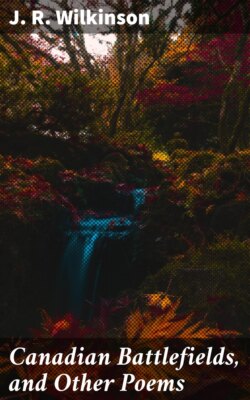Читать книгу Canadian Battlefields, and Other Poems - J. R. Wilkinson - Страница 17
На сайте Литреса книга снята с продажи.
ОглавлениеAwake! awake, Ojibways!
To dream in peace no more,
For there comes a bold invader
From eastward by the shore.
Rowing in swift, strong bateaux,
With strokes both strong and long,
To the cadence of fearless voices
In a gay boatman’s song,
Come full two hundred singers,
In boats, a score or more,
Far o’er the laughing waters,
Skirting the eastern shore.
Who are they, these fearless strangers,
Armed with sword and lance,
With arquebuse and musketoon?
They are fiery sons of France,
Exploring the boundless forests,
Locating rivers and seas;
Ignoring the red man’s title,
Coming his rights to seize.
Ha! they spy the eastern outlet
That leads to the lagoon,
Far across the teeming marshlands,
The domain of teal and loon.
They enter with eager spirits
This strange tract to explore;
And halting not, they discover
Point Pelee’s western shore.
A causeway of cedar and hillock,
From lagoon to lake they trace;
And their bateaux quickly transport
By way of the Carrying Place.
And they gaze on the expansion,
And cheerily launch away,
And disappear in the distance,
Across wide Pigeon Bay.
The Ojibways in amazement
Saw this strange concourse pass by;
A foreboding premonition
Whispered of danger nigh.
Mitwaos in council assembled
His chiefs and warriors brave;
Many scores of fiery stalwarts,
Of countenance stern and brave.
And calmly they deliberated,
Counselling for peace or war;
Should they allow these daring strangers
Their sacred rights to mar?
After the chiefs had spoken
Of the pending dangers nigh,
It was finally decided
The strangers might pass by
In peace, and unmolested,
If they did not interfere
With the vast teeming hunting grounds
Of the nation, far and near.
When three moons had waxed and waned,
The voyageurs, returning, came
From over the western waters,
Lit by the sunset’s flame.
And they drew up at the Narrows,
The Carrying Place again,
A “cut” in the cedar hillocks
Aglow with autumn’s flame.
De Orville, their gallant leader,
And Pontgravé and Le Jeune,
Knew their followers were weary,
And made decision soon
To bivouac near the marshlands
For a day of needed rest,
And to replenish their commissariat
With fish and game the best.
The camp-fires were all alighted
At the eve’s afterglow,
And the pines and cedars quivered,
And the waves made murmur low.
The scene was worthy a Rembrandt,
So rich the light and shade,
And the starry vault above them,
And the winds that whisper made.
“A song! a song!” de Orville cried,
“The night is rife with glory.
Let’s while a merry hour away
In singing and in story.”
“A song! a song!” as one they cry,
“Life hath enough of sorrow;
Sing while we may with hearts so gay,
Care cometh with the morrow.”
“Le Jeune! Le Jeune! lead on, lead on,
The stars are laughing o’er us;
Give us thy latest and thy best,
And we will join the chorus.”
Le Jeune had a poetic soul,
And voice of wondrous sweetness;
He reached men’s better, nobler part,
And won them to completeness.
And the groups about the camp-fires,
A picturesque, gay throng,
Heard many a quaint old story,
Pun, laugh, and ringing song;
And thus ’mid the wilds of nature
Passed the joyous hours away.
Light-hearted, merry Voyageurs,
Ever gallant and gay,
Beside the deep glowing embers,
Passed the night in calm repose,
And in the soft early dawning
Refreshened they uprose;
And with arquebuse and musketoon,
Spear, trap, and fishing-line,
They scattered o’er the marshlands
And ’neath the haunts of pine.
And from the Narrows and the shore,
Marshlands and wide lagoons,
There burst the crash of arquebuse
And roar of musketoons.
And all day long the sport went on;
At eve they counted o’er
A tempting hoard of luscious game,
Right welcome to their store.
